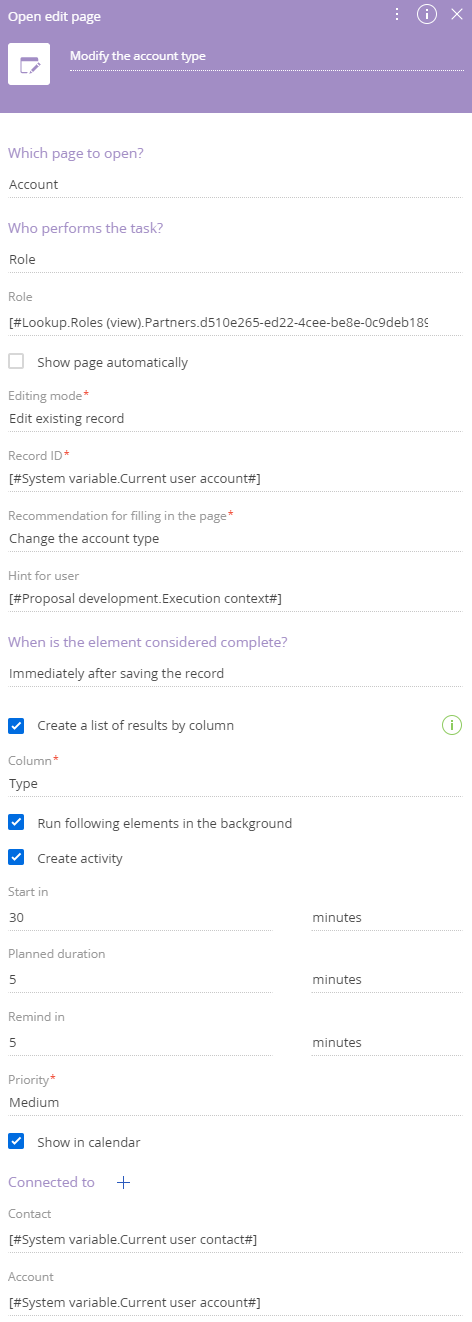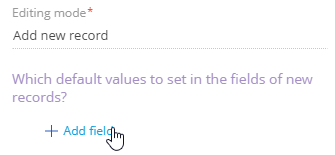Open a new or existing record page as part of the process using the Open edit page process element. For example, open an account page to view or edit the account information.
Specify the edit page parameters in the element setup area (Fig. 1).

Fill out the fields using the parameter value menu:
- Enter the element caption at the top of the element setup area. Creatio will display the caption on the process diagram.
- Which page to open? – select the edit page to open. This is a required field.
- Who performs the task? – select one of the options and fill out the field that opens:
- “User” – specify the user who will see the edit page in the Contact field.
- “Employee's manager” – specify the user whose manager will see the edit page in the Contact field.
-
“Role” – specify the role users with which will see the edit page in the Role field.
You can specify a dynamic parameter value or select a constant in the parameter value box.
- Show page automatically – select the checkbox to display the page automatically as soon as the process initiates the action.
- Editing mode – select one of the options: This is a required field.
-
Add new record – select this option to open the edit page of a new record. If you select this option, the Which default values to set in the fields of new records? field will become available. Click the Add field button to select the fields Creatio will populate automatically (Fig. 2).
Fig. 2 Select the fields Creatio will populate as part of the process
- Edit existing records – select this option to open the edit page of an existing record. If you select this option, the Record ID field will become available.
-
Recommendations for filling in the page – enter the recommendations to display on the edit page. The recommendation text is a single line string, therefore it does not support line breaks regardless of syntax. This is a required field. To display the text in the assignee's language, make sure the “Create business process tasks in the owner's language” (“UsePerformerCultureInUserTask” code) system setting is enabled and the Translation section includes the translation. Learn more: Localize UI via the Translation section.
- Hint for user – enter additional information about the task. Click the
 button on the record page to view the hint.
button on the record page to view the hint. - Create a list of results by column – select the checkbox to branch the process depending on the value of a record column. If you select the checkbox, the Column field will become available. The value of the column in this field will determine the element execution result. For example, after you fill out the opportunity page, the process may schedule a presentation or create a new contract, depending on the selected opportunity stage. In this case, create a list of results by the Stage column.
- When is the element considered complete? – select the conditions for completing the element.
-
Immediately after saving the records – the action will be considered complete once the user saves the record page.
-
If the record matches conditions – specify the filtering conditions. Set a filter by the columns of the current object or one of its connected objects. You can specify the filter value in several ways:
-
Compare with parameter – specify the filter value using the parameter value box. Select a process or element parameter.
-
Compare with value – specify the filter value using the specific column value.
-
-
- Run following elements in the background – select the checkbox to run the elements connected to the outgoing flows in the background.
- Create activity – select the checkbox to create a corresponding activity as part of this process step. If you select the checkbox, the following fields will become available:
- Start in – specify the period after which the activity must start, in minutes, hours, days, weeks, or months. The countdown starts as soon as the activity is created. Creatio uses this parameter to populate the Start field of the activity page.
- Planned duration – enter the activity duration, in minutes, hours, days, weeks, or months. Creatio uses this parameter to populate the Due field of the activity page.
- Remind in – specify the period that ends before the activity starts. After this period, the notification for the owner or the role will be created automatically.
- Show in calendar – select the checkbox to display the task in the Calendar view of the Activities section.
- Connected to – connect the task to other Creatio entities. For example, an account. Creatio will display the task on the Activities detail of the connected record. By default, the element setup area displays account and contact connections. Click the
 button to connect the task to other Creatio entities.
button to connect the task to other Creatio entities.